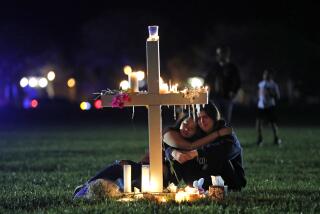‘There were at least 300 kids out there; there is somebody . . . who saw the shooting.’
The murder of Earnest Pickett Jr. should have been an open-and-shut case.
Clusters of students were milling around Dorsey High School when Pickett, 17, a senior honors student, was shot on a busy street corner across from the school on Jan. 20, 1984.
But more than five years later, Los Angeles police still lack the critical evidence they need--an eyewitness who will identify the killer or killers.
Pickett, a varsity baseball player, was heading home after school to retrieve his baseball gear when he was caught in the cross-fire between rival gangs, police said. Ronald Gregorie, 25, a suspected gang member, was also shot and killed during the melee.
Second base, Pickett’s position on the school team, was not his only strong point. A star student with better than a B average, Pickett was wavering between careers in medicine and engineering when he was shot down. He had been accepted at several colleges around the state, but had not yet decided which he would attend, his mother, Lee Bertha Pickett-Allen, said.
Two teen-age gang members were arrested within a month of the shootings, but murder charges were eventually dropped after a judge ruled that there was insufficient evidence for trial.
Police Detective Michael Anderson said he is surprised no eyewitnesses have come forward.
“There were at least 300 kids out there; there is somebody in that group who saw the shooting,” Anderson said in a recent interview. “I figured by now somebody might have had a conscience, but it doesn’t look that way.”
Pickett-Allen said she has not given up on finding her son’s slayer.
“I’m always looking for witnesses,” she said. “Often I feel depressed and depleted. Here my son was murdered and nobody cares.”
Pickett-Allen, who said she now divides her life into pre-murder and post-murder, believes police and school administrators are to blame for the unsolved crime.
“Everybody was so afraid someone else would get hurt,” she said. “No one encouraged these kids to come forward.”
Anderson said Dorsey Principal Jerelene Wells must shoulder some of the burden for the unsolved murders because she did not urge students to talk to police after the killings.
At the time, Wells was quoted in The Times as saying, “Unless we could personally guarantee that student’s safety, I don’t feel we can tell someone to step forward.”
Wells said she stands by her earlier statement.
“I don’t feel that, as a school administrator, I should become involved in a police investigation. My role was to help students deal with the pain,” Wells said.
Despite their bitterness, Pickett’s family has made sure he will not be forgotten.
Pickett-Allen and her husband, Charles Allen, have established in Pickett’s memory a scholarship fund for Dorsey students and an annual athletic award for the school’s outstanding athlete. “I feel it helps to keep a positive memory alive,” Pickett-Allen said.
But will the crime ever be solved?
“I have no idea,” said Detective Anderson. “I can’t tell you.”
More to Read
Sign up for Essential California
The most important California stories and recommendations in your inbox every morning.
You may occasionally receive promotional content from the Los Angeles Times.









